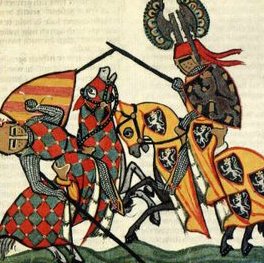Textuality » 4A Interacting
THE ANGLO-SAXSONS
-Germanic tribes.
-Language spoken: Germanic dialects.
-Entered in Great Britain after Romans had withdrown it, in 5th century.
-Stayed there until the Norman Conquest.
-They divided Great Britain into seven kingdoms (Northumbria, Mercia, East Anglia, Wales, Wessex, Sussex and Kent).
THE MIDDLE-AGES

Culture
-Most important codes: religion (common people) and chivalry (aristocracy).
-Salvation is, however, the most important thing for both common people and aristocracy.
-Hierarchic social structure (Pope -> Emperor -> Vassals and land owners -> Serfs).
-Religion (regular code) à It was followed mainly by common people. Often common people weren't able to read and write à ORAL LITERATURE (Ballads...).
-Chivalry (worldly/secular code) à Aristocracy followed it. Noble people were cultivated à WRITTEN LITERATURE (Epic poetry...).
-Theme of the literary texts: chivalry problems and religious problems. Will to reach salvation or to gain the admiration of the beloved woman make the characters act.
-Languages used: Latin-> Church-lawyers; Old English (language of German people that lived in Britain) -> people; French -> court. These three languages later combined to form the English spoken in London.
Events
- The Middle Ages cover a long period in the history of Europe.
- In Britain, it goes roughly from 1066 to 1485.
- 1066: date of the first and last conquest of Great Britain by a foreign power; the Normans, led by William I, came from Northern France.
- After the victory of Hastings, Britain belongs to William I, called "The Conqueror".
- William The Conqueror introduces a new social organization brought from the continent, the feudalism.
- FEUDALISM à Pyramidal organization according to which the king divides his lands among his vassals and barons in exchange for specific services.
- The vassals become tired of the heavy taxes à 1215: they force the king to sign the Magna Carta.
- MAGNA CARTAà result of a process of negotiation of power between the king (King John Lackland) and the barons. It limited royal power.